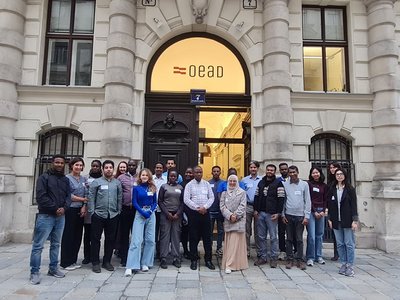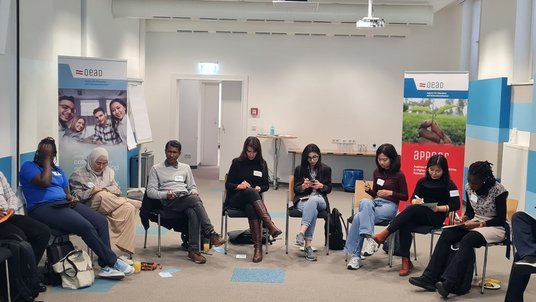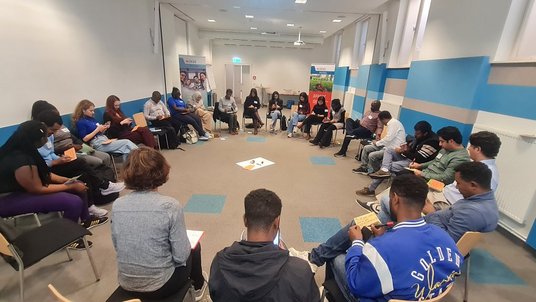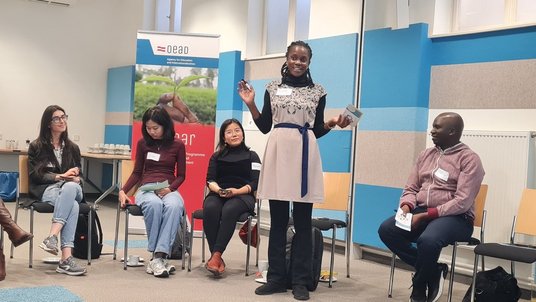

International students and researchers participated in the workshop on “Cultural awareness in communication. How to interact effectively across cultures” on 3 October 2024 at the OeAD. The workshop offered a chance to reflect on how culture shapes communication in different situations. Participants explored their personal values, examined how these are influenced by cultural backgrounds, and discussed their impact on communication. Through interactive discussions, they gained a deeper appreciation of diverse perspectives and learned practical strategies for adapting their communication in different cultural contexts. The workshop organised by EURAXESS Austria and the Austrian Partnership Programme in Higher Education and Research for Development was concluded by a networking dinner.

The workshop, led by Margaret Steixner, an experienced intercultural competence trainer, started with a fun icebreaker, the "Mad Tea Party," where participants paired up to answer questions, setting a relaxed and open tone. Then scholars were asked to share proverbs from their respective cultures, revealing how deeply values are embedded in language with proverbs serving as indicators of the values upheld by different societies.
In another activity, participants discussed symbols —like an onion, glasses, and glue—that can be used to explain cultural dynamics. Culture is the glue that holds a group of people together. It is defined by a shared understanding of values and behaviors and influences the way we interact in our daily lives. The onion model was introduced, showing culture's layers. The outer layer showing visible elements like food, language, and rituals. Beneath the surface lie the norms and values that guide behavior. These are less visible but essential to understanding a culture. At the deepest level are often unconscious and non-negotiable assumptions guiding behavior. Another symbol was the glasses, representing the idea that we each see the world through different perspectives, and individuals interpret reality in unique ways.

The following discussion emphasized the connection between values—what a culture prioritizes—and norms, the behaviors that reflect those values. It also explored how norms vary across cultures, often leading to misunderstandings in intercultural interactions. Attendees were encouraged to reflect on moments when they felt puzzled or out of place in another culture, learning to view these situations as opportunities to change perspectives. The goal was not necessarily to change deeply ingrained cultural assumptions but to accept and adapt to different ways of doing things. The facilitator used the metaphor of a fish in water to illustrate how we’re often unaware of our cultural environment until we experience a different one. When placed in new contexts, cultural differences become apparent, offering opportunities for growth.
Participants were also asked to reflect on their communication styles. Beyond the use of language and words, much of our communication is unconscious and influenced by our cultural background. Direct communicators express ideas clearly, addressing issues head-on, while indirect communicators rely more on context and nonverbal cues. They shared experiences from their own lives, discussed challenges, and explored strategies for improving communication. Margret offered tips: indirect communicators should prepare agendas and communicate clearly, while direct communicators should consider alternative perspectives and pay attention to nonverbal signals.

By the end of the workshop, participants gained a deeper understanding of intercultural communication, recognizing the importance of both surface elements and the underlying values that shape behavior and communication.
Some Feedback from the participants:
- The content was very relevant and much needed this early in our study period as we integrate into the Austrian community of diverse backgrounds.
- Well organized, active participation of the participant and good time management
- I enjoyed the food. The ambiance was great. I had an excellent experience sharing with different students across the room.
- The trainer is an excellent facilitator it was beautiful to note that she had a personal experience connecting to the different cultural representations in the room.
- The opportunity to meet and connect with participants from diverse backgrounds was invaluable, enhancing both our teamwork and communication skills.
Margret Steixner is an intercultural competence trainer with over 23 years of experience in creating inclusive learning environments for a variety of organizations. Holding a PhD in Educational Science and multiple certifications in coaching and group dynamics, she provides tailored training, coaching, and consulting to enhance intercultural competence and collaboration. Margret employs interactive methodologies to design engaging workshops. Her expertise includes intercultural awareness, conflict resolution, dialogue facilitation, team building, and leadership development.
You can find more information on: www.intercultural-perspectives.com
